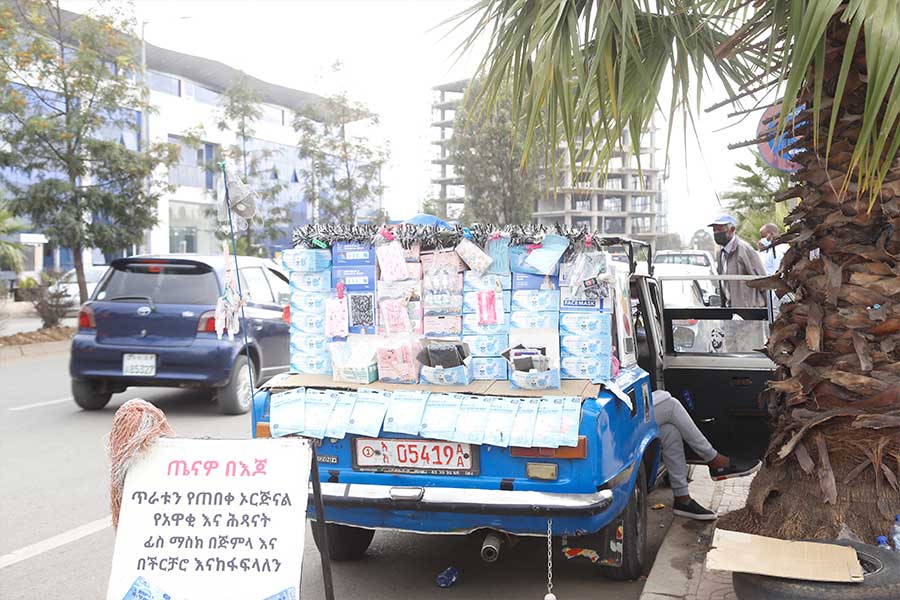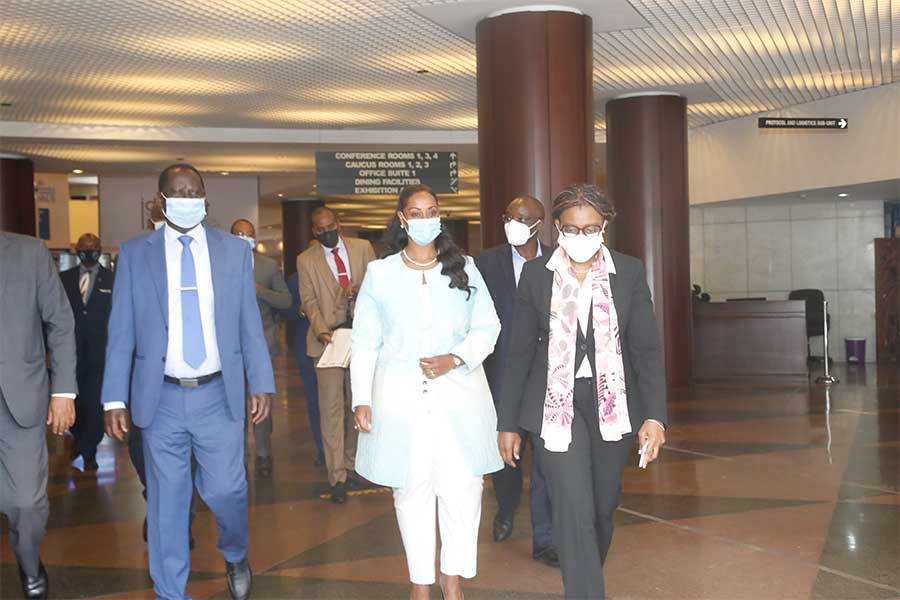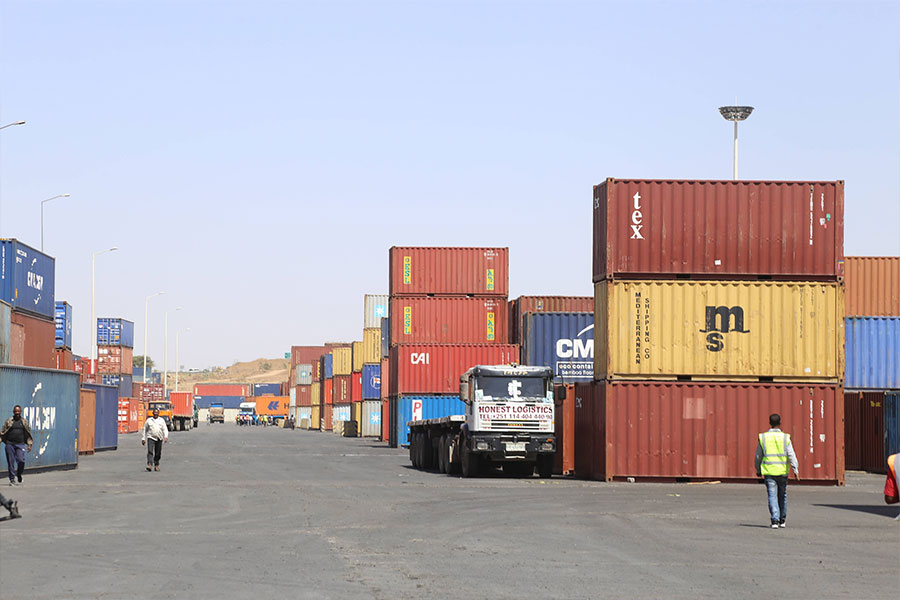
Radar | May 14,2022
Farming practice by smallholder farmers to grow crops in rhythm on adjacent plots will be legalised, hoping to stir agricultural productivity. A bill legalising the practice and allowing its commercialisation is in the making. It will also compel farmers benefiting from state-financed irrigation projects to apply cluster farming.
The practice was introduced two years ago, dubbed agricultural commercialisation clusters, following three years of trial. Under the cluster-farming method, farmers sharing land grow seeds simultaneously, apply the same fertilisers, receive similar levels of technical support, and harvest using shared machinery. There are 1.3 million smallholder farmers using cluster farming, ploughing 44,000hct of land. It is a fraction of the 18 million smallholder farmers engaged in agricultural production.
But the absence of laws governing relationships between farmers sharing plots hindered the progress of cluster farming.
Esayas Lemma, director of crop development at the Ministry of Agriculture (MoA), confirmed that the cluster programme could not move forward.
"The approach is not expanding as expected,” Esayas told Fortune.
There is no legislation to ensure compliance or resolve disputes between farmers and other parties, including regional administrations and the federal government.
The Director observed a lack of awareness on the farmers' side has also been an issue.
However, federal officials plan to take cluster farming to 300 weredas, onboarding five million smallholder farmers over the coming two years. They say that mechanisms for monitoring, evaluating, and facilitating the practice is crucial to meeting their aspirations.
This holds for smallholder farmers like Deriba Gutema, 40, who have no access to modern agricultural technology and inputs. Before applying cluster farming with seven of his peers in 2018, Deriba depended on his 1.5hct plot in Ada'a Wereda, Oromia Regional State, to provide for eight children. He was a subsistence farmer, mainly farming teff.
Though he has seen productivity jump by nearly a third to 85qtl since, the farmer says there are still issues to be worked out.
“Accessing inputs like improved seeds is becoming very difficult,” Deriba told Fortune.
The Oromia Regional State is home to 60pc of the land ploughed through cluster farming. Yet, regional authorities say the programme is lagging.
Lemma Bogale, deputy director of the agriculture extension programme at the Oromia Agriculture Bureau, believes it is demanding to provide extension services to farmers applying cluster farming in the absence of a legal framework.
“Expansion in Oromia has been limited although farmers in the region began to use the approach three years ago,” said Lemma.
These are issues present in other regional states, too.
Supplying farmers with inputs in the Sidama Regional State is a challenge, according to Karissa Shora, director of soil development at the regional agriculture bureau. Farmers in Sidama used to get improved seeds from neighbouring regional states, such as Benishangul-Gumuz and Oromia.
“Securing sufficient volumes of improved seeds and fertilisers has proved complicated," Karissa said. “That there are no laws has made it difficult for the regional administration to provide the necessary support to farmers."
The bill, which is set to repeal a 17-year-old proclamation, proposes that regional administrations be tasked with providing improved seeds, chemical fertiliser and machinery. Their officials are expected to legislate laws that outline the support they are mandated to avail to farmers, provided Parliament gives approving nods to the bill.
Arega Shumetie has been lecturing on agricultural economics in public universities. He is now a senior researcher at the Ethiopian Economics Association. He believes the legal framework is necessary to edge out the dominance of subsistence farming and encourage commercially-oriented agriculture.
“Most farmers who grow crops on small and fragmented landholdings produce mainly for themselves,” said Arega.
The average landholding size is 0.84hct, while around 30pc of small-holding farmers possess less than a hectare of farmland. Agricultural productivity has been growing at a snail's pace. Official data put last year's harvest at 341.8 million quintals of crops, a 68pc increase compared to a decade ago. However, researchers point out a loss of millions of tons of productivity due to war in the productive areas of the country.
Arega says expanding cluster farming at a scale requires tremendous resources, including public spending on improved seeds and fertilisers. Only a third of smallholder farmers use chemical fertiliser, while demand for improved seeds was estimated at 2.1 million quintals last year, over four times higher than the supply.
Esayas from the Agriculture Ministry disclosed that the bill aims to bring more crop varieties under cluster farming. It has thus far been limited to five crops, including wheat, teff, and barley. Officials say they plan to see no less than 31 crops by 2024.
The bill also provides guarantees and dispute resolution methods for farmers who rent plots to a third party, according to Esayas.
The current proclamation that governs the use and administration of rural land was legislated in 1997. It allows commercial farmers to rent farmland. The regional states' administrations have extended the right to lease plots to small-scale farmers.
Yitbarek Abeje, 81, lives in Gozamen Wereda, Debre Markos, in the Amhara Regional State. A father of five, he cannot make use of his land for old age. All his children live away from him.
“No one is around to help me plough my land,” he said.
Over the past two decades, Yitbarek rented out 2.5hct to other farmers for half of the yield from the leased plot. Last year, he received 15qtl of grain.
However, resolving disputes has been challenging for farmers like Yitbarek. Existing laws govern that disputes are resolved by an arbitration body elected by the parties in dispute. The bill, however, will allow claimants to take their cases to regular courts. The bill will also allow farmers to access credit using landholding certificates as collateral. Despite the absence of federal laws, regional administrations have introduced legislation that would enable rural landholders to access credit from microfinance institutions (MFIs) against land certificates.
Karissa, the director, says two microfinance institutions in the Sidama Regional State provide credit to farmers against certificates as collateral.
“However, progress has been slow," he said.
The Omo and Agar microfinance institutions provide credit to farmers in the South Western and Sidama regional states. They had advanced close to 103 million Br as of December 2021.
Officials at the Agriculture Ministry say they expect the bill to gain approval before July's end of the budget year. The bill had been tabled to Parliament last year after six years of work but was sent back six months ago. Federal legislators wanted it to reflect the administration's restructuring following the sixth national elections.
PUBLISHED ON
May 10,2022 [ VOL
23 , NO
1149]

Radar | May 14,2022

Fortune News | Feb 26,2022

Fortune News | Aug 27,2022

Radar | Apr 30,2021

Featured | Jul 27,2019

Fortune News | Jul 06,2019

Radar | Jul 03,2021

Delicate Number | May 28,2022

Obituary | May 21,2022

Fortune News | Aug 28,2021

Dec 22 , 2024 . By TIZITA SHEWAFERAW
Charged with transforming colossal state-owned enterprises into modern and competitiv...

Aug 18 , 2024 . By AKSAH ITALO
Although predictable Yonas Zerihun's job in the ride-hailing service is not immune to...

Jul 28 , 2024 . By TIZITA SHEWAFERAW
Unhabitual, perhaps too many, Samuel Gebreyohannes, 38, used to occasionally enjoy a couple of beers at breakfast. However, he recently swit...

Jul 13 , 2024 . By AKSAH ITALO
Investors who rely on tractors, trucks, and field vehicles for commuting, transporting commodities, and f...

Nov 1 , 2025
The National Bank of Ethiopia (NBE) issued a statement two weeks ago that appeared to...

Oct 25 , 2025
The regulatory machinery is on overdrive. In only two years, no fewer than 35 new pro...

Oct 18 , 2025
The political establishment, notably the ruling party and its top brass, has become p...

Oct 11 , 2025
Ladislas Farago, a roving Associated Press (AP) correspondent, arrived in Ethiopia in...